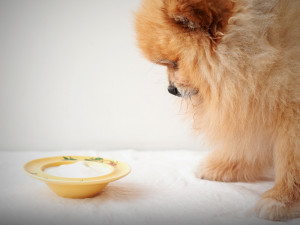Can Dogs Eat Honey?
They shouldn’t exactly have their paw in the honey jar constantly, but the sweet stuff can be beneficial in some cases

Share Article
Did you know that honey contains over 200 different substances and has been used in traditional medicineopens in a new tab since ancient times? Humans have found many different uses for honey, and there is convincing evidence that it has antibacterial, anti-inflammatory and anti-oxidant benefits. We don’t know for sure if these effects all work on dogs, too, but it is safe for most dogs and may help with certain ailments.
Here’s how honey can help your pup (which might be useful info to know if they’re currently staring at you while you drizzle the good stuff on your breakfast).

littleKin™ is Kinship’s home just for puppy and kitten parents. Bop over to check out expert advice, new pet tools, and special deals—all curated for your newest family member.
opens in a new tabIs honey good for dogs?
Honey is safe to give to most dogs in small amounts. In many cases, it is not going to have a dramatic effect on their overall wellbeing, but it is non-toxic and fairly safe. It would be fine to give your dog a treat or a taste of foods that contain honey every now and then. If you are considering using honey as a treatment for a specific medical problem, there are other factors to keep in mind. Different kinds of honey may have different beneficial properties.
Many medical conditions will require additional therapies in combination with a supplement like honey to see the most improvement, so it is important to consult with a veterinarian and get a clear diagnosis before attempting to treat with honey. The good news is that there are some exciting potential benefits from using honey as part of your pup’s treatment plan, and it is relatively safe and easy to use.
How can I give honey to my dog?
Honey can be given by mouth or used topically to treat certain conditions. Because honey contains lots of sugar, most dogs will eagerly lap it up from a spoon – though they may not entirely love the sticky consistency, especially if it gets on their fur and whiskers. You could also mix it into their food or offer it on top of a favourite treat, so that it will be easier to eat and less likely to stick to their mouth. It is important to give honey sparingly because it is high in sugar and calories and may contribute to weight gainopens in a new tab otherwise.
What are the potential benefits of giving honey to dogs?
There are many claims about honey’s benefits, but not all have been thoroughly studied. Some are well-documented and have been successfully used in both traditional medicine and Western medicine. Many factors can influence these benefits, including what kind of honey you use and how you apply it.
For example, local unpasteurised honey will have unique benefits for conditions like hay feveropens in a new tab because it is made from the local pollen. Honey might be applied directly to the skin in some situations, versus taking it by mouth in others. Often, the improvements from honey alone are mild and work best in combination with other therapies, so be sure to work closely with your vet to make sure you are giving your dog the best chance for success.
Antibacterial and anti-fungal properties
Honey has well-studied antimicrobial properties, meaning that it can help to kill different kinds of nasty bugs, including bacteria and fungi that can cause infections in dogs. It does this by dehydrating these bugs and creating an acidic environment with a high-sugar content that prevents the growth of many bacteria and fungi. To take full advantage of these properties, it is best to apply honey topically to the area of concern. In fact, vets will sometimes use honey as part of a wound dressing for specific injuries. It can help to keep the wound clean and promote healing when it cannot be closed right away with stitches.
Immunity-boosting properties
Studies in miceopens in a new tab have shown that honey may increase the production of antibodies and help to produce a stronger immune response. There is limited evidence to confirm whether or not this happens in dogs, and how much of an overall effect it might have on a dog’s immune system. There would be little harm in giving it to otherwise healthy adult dogs; however, it could be unsafe to give it to dogs who are already immunocompromised.
Antioxidant properties
Honey is a good source of antioxidantsopens in a new tab, including vitamin C, flavonoids and polyphenols, which can help to protect cells from damage caused by free radicals. These effects have been measured when honey is given by mouth. Honey that is darker in colour is likely to have more antioxidants.
Digestive health benefits
Honey may help to improve digestive health by reducing inflammation, preventing certain infections from taking hold and promoting the growth of beneficial bacteriaopens in a new tab in the gut.
Skin health benefits
Because of the antimicrobial, anti-inflammatory and antioxidant properties of honey, it may help to soothe certain allergic and inflammatory skin conditionsopens in a new tab. This information comes from evidence in humans and is still being studied in dogs. In order for it to be effective in treating the skin, honey usually needs to be applied topically to the affected area but may help with seasonal allergies when given by mouth, too. It is very important to treat any underlying infections or skin parasites first, as these are some of the most common causes of itchy skin in dogs.
Cough suppression
In human researchopens in a new tab studies, honey has been shown to be as effective as over-the-counter cough syrup for decreasing mucus secretions and reducing inflammation, resulting in less coughing. It may be helpful in reducing coughing in dogs for these same reasons as long as your vet gives the OK. It could be dangerous to give to a dog who is having difficulty breathingopens in a new tab and is not a substitute for prescription medications that treat more serious underlying respiratory problemsopens in a new tab.
Are there any risks or side effects of feeding honey to dogs?
Honey is considered non-toxic and safe for most dogs in moderation. There are some important points to consider before giving your dog honey, especially if you plan to use it as a long-term supplement.
High sugar content
Sugar is the main ingredient in honey, so it is important to use it in moderation. Too much honey, or any other foods that are high in sugar and/or calories, can lead to weight gain and related health problems in dogs. As with any other treats or supplements, be sure to factor in the calories from honey as part of your dog’s overall daily intake. Modify the rest of your dog’s treats and feedings to maintain a healthy caloric intake overall.
Botulism
Honey can contain spores of the bacteria Clostridium botulinum, which can cause botulism, a form of limp paralysis. Adult dogs with normal immune function and healthy digestive tracts are resistant to these spores and would not be at high risk of contracting botulismopens in a new tab. Puppies with immature digestive tracts, dogs who are immunocompromised or dogs with serious disease of the digestive tract would be at risk for botulism and should not be fed honey.
Allergic reactions
Honey is not a common source of allergic reactionsopens in a new tab in dogs. It does contain different kinds of pollen, depending on the source of the honey and in very rare cases, this could result in signs of an allergic reaction. These signs include hives, rubbing at the face, swelling of the face, vomitingopens in a new tab, diarrhoeaopens in a new tab and/or difficulty breathing. See a vet right away if you notice any of these signs and discontinue giving your pup the honey.
Toxins from other ingredients
Remember to check the ingredients on any product you are considering giving to your dog. Some products that are perfectly safe for humans can be toxic to dogs. This is true for products that are applied topically, too, especially because dogs have a tendency to want to taste anything on their fur and often lick it all off. Make sure you are using pure honey and not something intended only for humans.
Matted fur
This is more of a nuisance than a major risk, but keep in mind how sticky honey is before slathering it on your pup. It’ll muck up their fur and will be a magnet for picking up all kinds of other dirt and debris as they wander around. Ideally, use a minimal amount of honey on a spot where the fur has been clipped short. Try to keep your dog clean and quiet for a few hours after applying it. Consider throwing a loose shirt or bootie over the spot as well, since your dog may quickly lick it off if it is within reach.
Should I consult my vet before giving honey to my dog?
It is very important to consult your veterinarian before giving honey to your pup. While you may be observing certain abnormalities with your pup, there are other signs you might not be able to see. With a thorough physical exam and possibly some additional tests, your vet will make a specific diagnosis that may require prescription medication or other interventions. You don’t want to miss out on getting your pup the best possible treatment while you test out home remedies for something that may be more serious. In other cases, honey may be a perfectly safe addition to your dog’s other treatments, but it is best to be sure and check with your vet first.
How much honey can I give my dog?
There is no specific dose of honey known to be effective in dogs, and because honey can be used as a supplement for many different reasons, there is likely a lot of variation in what works. It may take some trial and error to find the sweet spot, pun intended. If you are giving honey by mouth, many sources suggest giving about one teaspoon per day of local, raw, unfiltered honey.
Keep in mind how big your dog is and their overall caloric intake; a teacup Yorkie should have only about a quarter of this dose, while a large breed dog may need a bit more. Depending on what the goal of treatment is, it may take between 45–60 days to see any changes. If there is no improvement after 60 days, it is unlikely to work.
Are there any alternatives to honey for dogs?
There are many alternatives to honey, depending on the intended use and problem you aim to treat. This is another good reason to consult your vet before starting a daily spoonful of honey for your dog. Your vet may know of a quick way to cure your dog’s pesky problem that will be faster and probably much less sticky. In other cases, honey may not be potent enough to really help your dog feel better if they have a serious health problem. If you are looking for a supplement for a chronic disorder, consider meeting with a holistic veterinarian as well as your usual vet to find options that will target your dog’s specific problems.
Honey has many fascinating properties that can be helpful in treating all kinds of different conditions. It is no wonder that it has been a remedy since ancient times and is still being used in modern medicine. If you are curious about giving honey to your dog, be sure to consult your vet first, and make sure your pup has a thorough physical exam to identify any serious underlying health problems. If you do opt to give your pup honey, start by giving a very small amount and watch for any unusual changes or signs of an allergic reaction.
Frequently asked questions
1. What are the potential benefits of giving honey to dogs?
There are many potential benefits to honey, but not all have been thoroughly studied. Some of these benefits include its antimicrobial properties, anti-inflammatory effects, benefits to immune function, cough suppression and digestive health benefits.
2. How much honey can you give a dog?
There is no specific dose of honey known to be effective in dogs, and because honey can be used as a supplement for many different reasons, there is likely a lot of variation in what works. Some sources suggest giving about one teaspoon per day of honey to dogs.
3. Are there any risks or side effects of feeding honey to dogs?
Things to keep in mind when giving honey to your dog are that honey is high in sugar and the excess calories can lead to weight gain. Also, honey is known to contain spores of the bacteria that causes botulism, so it should not be fed to young puppies or any dogs that are immunocompromised. Other potential risks include other toxins that may be present in products intended for humans, risk of allergic reaction and/or matted fur when used topically.
4. How can I give honey to my dog?
You can give honey to your dog by mouth, either directly on a spoon or mixed in with some food or a treat. In other cases, it may help to apply honey topically to the skin.
5. Does honey help a dog’s upset stomach?
Honey may help to improve digestive health by reducing inflammation, preventing certain infections from taking hold and promoting the growth of beneficial bacteria in the gut. It will not cure serious digestive conditions including vomiting or diarrhoea, so you should always talk to your vet if you notice these signs.
6. Should I consult my vet before giving honey to my dog?
Yes. Honey can be risky to give to some dogs, so it is always best to check with your vet first. Also, your vet may have other very effective treatment options to try in addition to the honey which will help to get your dog feeling their best as soon as possible.
Resources
Traditional and Modern Uses of Natural Honey in Human Diseases: A Review opens in a new tab
The Potential use of Honey as a Remedy for Allergic Disease: A Mini Reviewopens in a new tab
Note: while caution was taken to give safe recommendations and accurate instructions in this article, it is impossible to predict an individual dog’s reaction to any food or ingredient. Readers should consult their vets and use personal judgement when applying this information to their own dogs’ diets.

Dr. Amy Fox, DVM
Amy Fox, DVM is a small animal veterinarian in New York City. A lifelong animal lover, Dr. Fox studied biology in college and then worked as a veterinary nurse before pursuing veterinary school at Cornell University. She has worked in many different settings including shelter medicine, emergency medicine, general practice, and animal cruelty and forensics. She is especially interested in nutrition, preventative medicine and care for senior pets. Dr. Fox also enjoys writing about veterinary medicine and teaching. In her free time she loves to cook, garden, and go for long runs.
Related articles
![Pet owner feeding white rice to her Shih Tzu dog.]() opens in a new tab
opens in a new tabCan Dogs Eat Rice?
Yes, actually. Just follow these guidelines
![Pomeranian stands in front of a yellow bowl of homemade probiotic yogurt]() opens in a new tab
opens in a new tabAre Probiotics Actually Something Your Dog Needs?
Time for a (literal) gut check from four experts
- opens in a new tab
Glucosamine For Dogs: Everything You Need to Know
You may have heard other pup parents praising this supplement. Here’s what a vet has to say
![Side view of a cute hungry dog standing next to a red bowl with food in a studio with white background]() opens in a new tab
opens in a new tabHow to Get a Dog to Eat
You can’t appease a picky dog with chicken nuggets like you can with a toddler. Here are some things you can do
- opens in a new tab
Can Dogs Eat Kale?
Yes, this superfood is good for your dog in small amounts












